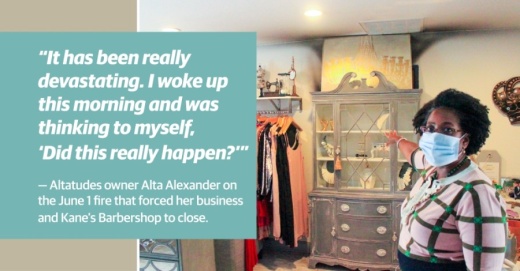Around 3 on the morning of June 1, Stephen Bass-Kane was woken up by a phone call from Joel Baker, the chief of the Austin Fire Department and a regular customer at Kane's Barbershop on East 12th Street.
"'You need to get up. Your shop's on fire,'" Bass-Kane remembers Baker telling him on the phone.
On the way from his house in Pflugerville to the shop, Kane said he was thinking not so much about himself but about the others who would be affected—the other barbers who work at his shop, and Alta Alexander, the owner of Altatudes, the store next door.
Kane called Alexander shortly after he heard the news, and she made her way down to the store from Leander. Kane's and Altatudes share an adjoining door on the inside of the building. Kane's shop was completely burned, and while the walls at Altatudes were intact, the smoke and soot damage ruined everything inside.
"It’s been really really devastating. I woke up this morning and was thinking to myself, ‘Did this really happen?,'" Alexander said June 2, the day after the fire.
The fire department said it has determined the case of the fire at Kane's was an electrical failure and was accidental, according to a spokesperson.
The fire means East 12th Street will lose—at least temporarily—two black-owned businesses in an area that has been a center of black culture in Austin for decades.
According to a 2018 strategy report prepared by the city, local business associations and nonprofit partners, the area known as "The End" in the 1940s and '50s "was the heart of entertainment and commerce in Austin's African American community."
Bass-Kane said it was that black community that drew him to the area in the first place. Before the fire, his shop had been open on East 12th Street for a little over three years.
"The black community reminds me of the street I grew up in Dallas; I like being around the people I can relate to," he said.
Black-owned businesses and cultural centers are still very much a part of the East 12th Street district. NAACP President Nelson Linder has his insurance agency's office at 1704 E. 12th St. Simpson United Methodist Church, Mount Carmel Grand Lodge Temple and Sam's BBQ are among the other longstanding presences in the community.
However, as property values get more expensive, it has become harder for black business owners to stay in the neighborhood. It is a trend that has been mirrored in Austin's population as a whole. From 1990-2018, according to U.S. Census Bureau data, the city's black population dropped from 12.4% of residents to 7.8%.
Keeping the district a center of black businesses in Austin is part of the reason Bass-Kane and Alexander, who is the president of the East 12th Street Merchants Association, said they are determined to rebuild after the fire.
“Both of us really want to come back. That’s the goal. It’s important to live out our own dreams; it also precipitates other dreams to people,” Alexander said.
As of June 3, a GoFundMe page set up to help the two businesses recover has raised more than $50,000.
'Something needs to be done'
Like many Americans, Bass-Kane and Alexander have been closely watching images through the past week of protesters voicing their anger in the streets of cities all over the country at the treatment of black Americans at the hands of police.
The protests began after George Floyd died in police custody in Minneapolis on May 25. On June 3, Minnesota Attorney General Keith Ellison announced former police officer Derek Chauvin, who kneeled on Floyd's neck for 8 minutes and 46 seconds, has been charged with second-degree murder. The other three former officers on the scene have been charged with aiding and abetting murder.
Alexander said she wept when she watched the video a bystander captured in the moments before Floyd's death. She said the message needs to be sent that the black community is in turmoil—and scarred by watching the same scenes playing out over and over again in cities across the U.S.
“We are a part of this humanity, and something needs to be done,” she said.
Bass-Kane said when he was growing up he knew he wanted to be in law enforcement or be a barber. He has friends and customers who are police officers—and he said there have been conversations in the shop about the issue. Bass-Kane said he understands not all police have ill intentions, but that does not help him shake a feeling he is not safe in interactions with police.
"I’m a little nervous. I've got three daughters, and I don’t know if I'm going to get home to them," he said.
Locally, protests that began over the weekend in Austin continued through the night of June 2. In addition to marching for George Floyd, Austin's protesters have spoken out against an Austin Police Department officer shooting and killing an unarmed man, Michael Ramos, on April 24.
Alexander said one thing supporters of racial justice can do to help is to support black-owned businesses both in the East 12th Street district and across the city.
“I would love to see people making an intentional effort to be more inclusive in their business choices," she said.
Meanwhile, she and Bass-Kane are filing the insurance paperwork and making preparations to bring their businesses back. They do not know when they will be up and running again, but they said they are determined to do their part to keep East 12th Street a hub of black business and culture in Austin.





